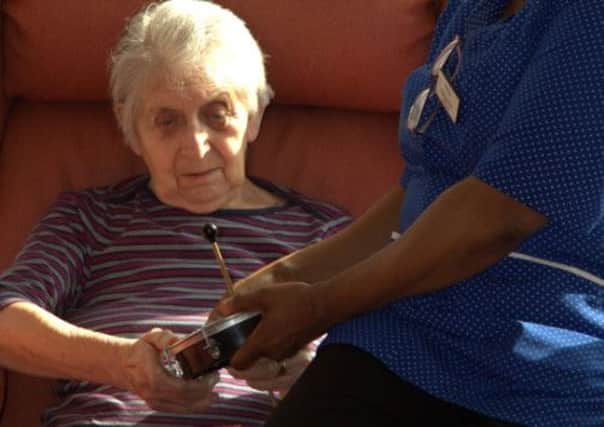How music could hold the key for managing memory loss


Margaret Torrance often plays the piano for a rapt audience, reeling off one note-perfect tune after another without so much as a glance at a sheet of music.
She also has trouble remembering her daughter’s name, does not know she has grandchildren and struggles to hold a conversation lasting longer than a few minutes.
Advertisement
Hide AdAdvertisement
Hide AdMargaret is 81 and was diagnosed with vascular dementia four years ago. She has been in a care home since July 2010.
A talented pianist, she regularly plays for other residents on the piano which she and her husband bought in the 1950s and which her daughter, Jan, gave to the home so her mother could continue doing what she loved.
“There are very direct, close connections between the music that we like – which activate these emotion and reward sensors – and your hippocampus, which is where all your emotions are stored,” says Dr Vicky Williamson, a research fellow at Goldsmith’s University in London who specialises in the relationship between music and memory.
For Margaret, music is a way of managing her condition, calming her when she becomes distressed or disoriented and works where tradition drug treatments can’t.
Advertisement
Hide AdAdvertisement
Hide AdWith a growing elderly population, dementia is a particular concern in the UK, where a person is diagnosed every 3.2 minutes. It affects well over a million people: 800,000 sufferers and their 670,000 carers.
It can be extremely difficult to live with, and one of the cruellest aspects of the disease is memory loss. Sufferers of late-stage dementia forget the names and faces of their dearest family members and cannot understand where they are or why they are there. Unable to express this frustration, they can become angry and aggressive.
Traditional treatment involves drugs to try to alleviate symptoms and slow down the progression of the disease, but their effects are limited. Music therapy is increasingly becoming a legitimate way of managing various conditions – including dementia – and there are now 600 registered music therapists in the UK.
Although many professionals recognise the benefits music can have on sufferers, a recent study by Bupa, which is now running music therapy sessions in homes across the UK, found that fewer than one in ten people would consider using music to communicate with a relative who has dementia.
Advertisement
Hide AdAdvertisement
Hide AdOne example is Anglesea Heights in Ipswich, where staff ask for information about a resident’s musical tastes when they first arrive. Music is an integral part of the residents’ lives. A music therapist runs weekly one-hour sessions for all 120 of them. They are encouraged to join in either by playing instruments or singing or even dancing along.
The home introduced the sessions nine years ago, and manager Tina Askew says both residents and their relatives have noticed the beneficial effects, even for patients with the most advanced illnesses.
But music therapy is beginning to spread beyond care homes, and within the last decade a number of organisations have begun to offer musical sessions to dementia sufferers.
In 2003, the charity Alzheimer’s UK launched a nationwide initiative called ‘Singing for the Brain’, running weekly sessions at which dementia sufferers and their carers can sing and socialise.
Advertisement
Hide AdAdvertisement
Hide AdLost Chord, a Sheffield-based charity also set up in 2003, employs professional singers and musicians to perform live at care homes nationwide.
Not all dementia sufferers will have access to music therapy or sessions like these, but that doesn’t mean that they can’t benefit from music. Simply listening to a song with emotional significance can have a positive effect and bring back memories.
“The wonderful thing about memory is you can think of it as a line of dominoes, rather than simply a link between two different isolated things,” Dr Williamson explains.
“By triggering off an emotional or a motor-behavioural response that is associated with music, you might collapse the domino chain to other types of memory. Music is a key link in a chain rather than the end point you’re trying to get to.”
Advertisement
Hide AdAdvertisement
Hide AdFor Margaret Torrance’s daughter Jan, music continues to provide her and her family with some comfort, and even moments of humour. She describes a visit to her mother a few months ago, on one of her more lucid days.
“She told me, ‘They’ve got me working hard playing that piano again’, and she said it with a bit of a smile on her face.”